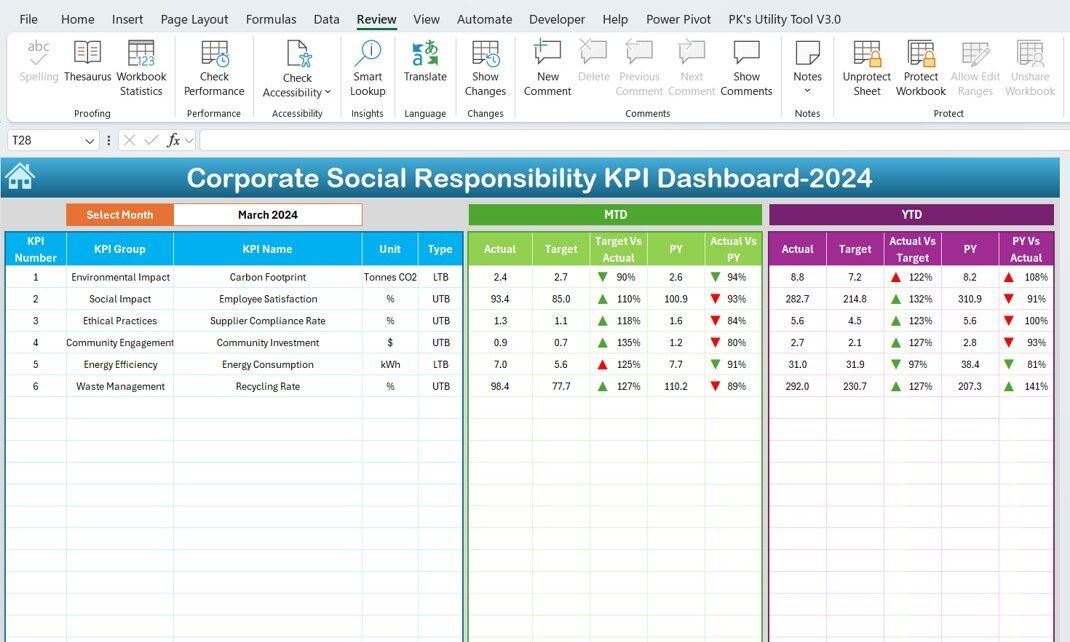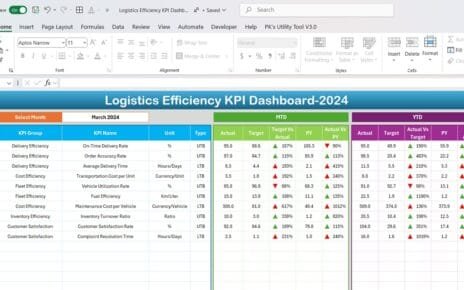Corporate Social Responsibility (CSR) has become a cornerstone for businesses aiming to demonstrate their commitment to ethical practices and community involvement. Tracking and measuring the impact of these initiatives is crucial, and that’s where a Corporate Social Responsibility KPI Dashboard in Excel becomes invaluable. This guide will walk you through the key features and functionalities of a well-structured CSR KPI Dashboard in Excel, designed to simplify the tracking and analysis of your CSR activities.
Click to Purchase Corporate Social Responsibility KPI Dashboard in Excel
What is a Corporate Social Responsibility KPI Dashboard?
A Corporate Social Responsibility KPI Dashboard is a dynamic tool used by businesses to monitor and evaluate the effectiveness of their CSR activities. It integrates various key performance indicators (KPIs) that help companies measure their impact in areas such as environmental stewardship, social involvement, and economic performance.
Key Features of the CSR KPI Dashboard
This ready-to-use CSR KPI Dashboard comes packed with several robust features designed to offer comprehensive insights into your CSR initiatives. Here’s a breakdown of its components:
Home Sheet
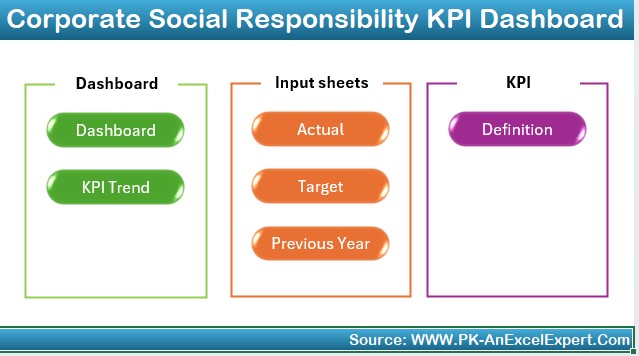
- Overview: The home sheet serves as the central navigation hub of the dashboard with quick access buttons that direct you to various other sheets.
- Functionality: It features six buttons for effortless jumping to respective sheets, enhancing user interaction and accessibility.
Dashboard Sheet Tab
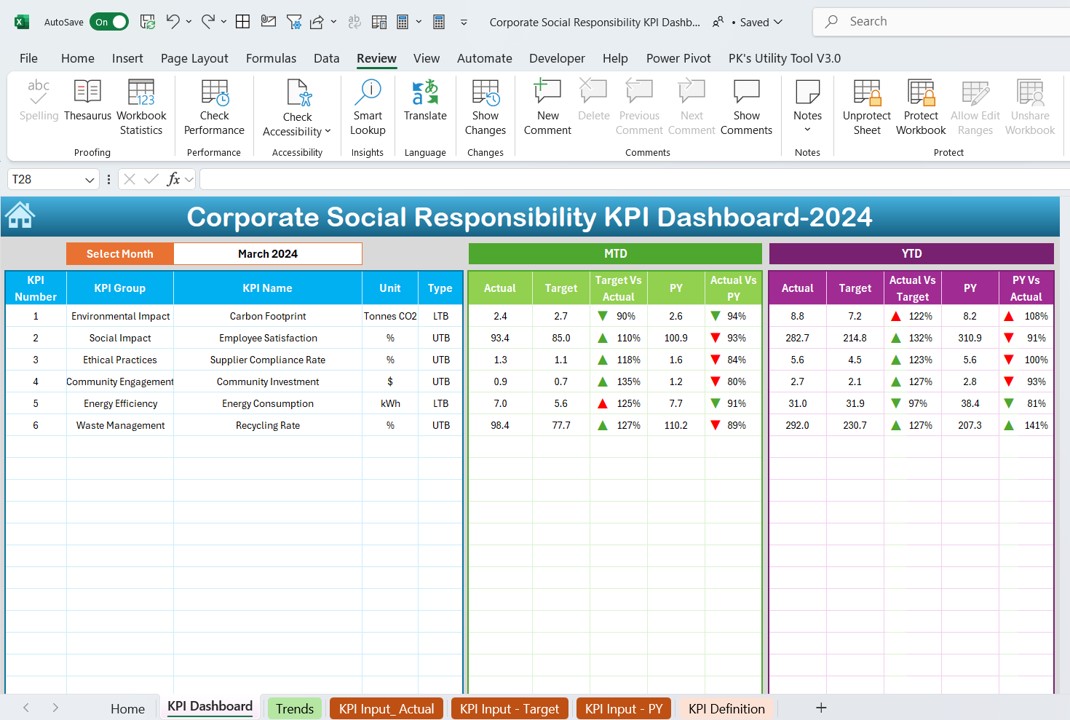
- Core Display: This is the main tab where all critical KPI information is consolidated.
- Interactive Elements: It includes a dropdown for month selection, which dynamically updates all dashboard metrics for the chosen period.
- Visual Metrics: Displays both Month-To-Date (MTD) and Year-To-Date (YTD) actuals versus targets, alongside Previous Year comparisons using visually intuitive conditional formatting arrows.
KPI Trend Sheet Tab
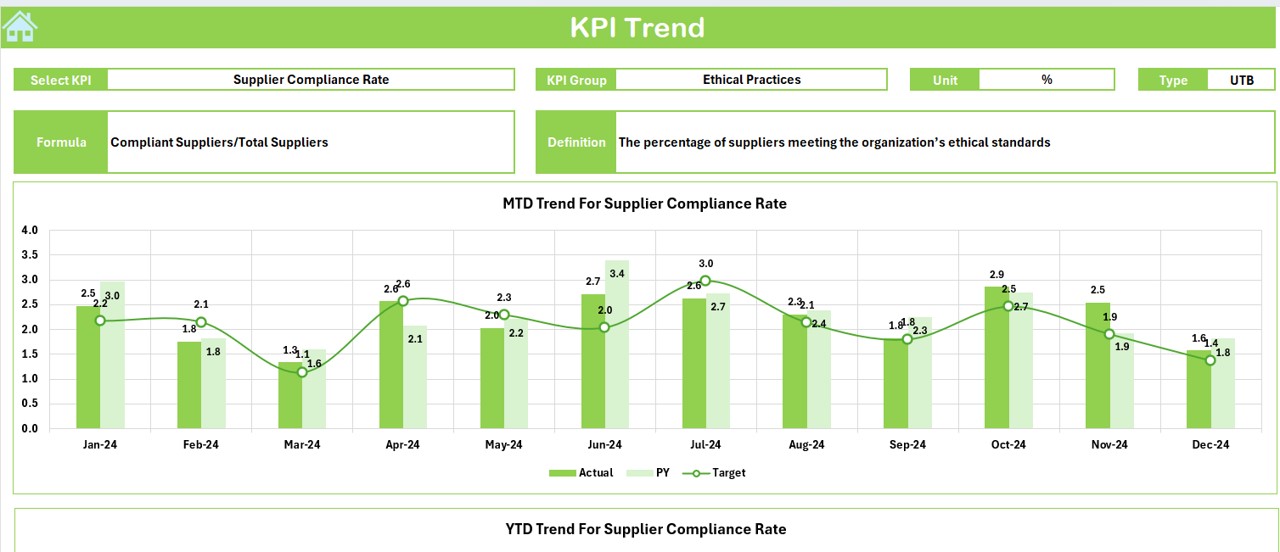
- Selection Tool: Users can select a KPI from the dropdown to view detailed metrics.
- Detailed Insights: Shows KPI Group, Unit, Type (whether ‘lower is better’ or ‘upper is better’), the formula used, and a comprehensive definition.
- Trend Analysis: Visual trend charts for MTD and YTD actuals, targets, and previous year data provide a historical performance perspective.
Actual Numbers Input Sheet

- Data Entry: Here, users input actual figures for MTD and YTD for selected months.
- Flexibility: Allows for month adjustments, facilitating data entry from the start of the fiscal year.
Target Sheet Tab

- Purpose: Designed for inputting monthly and yearly target figures for each KPI.
- Structure: Ensures consistency in target setting across all KPIs.
Previous Year Number Sheet Tab

- Historical Data Entry: Similar structure as the actual numbers input sheet for entering last year’s data, enabling year-over-year performance comparisons.
KPI Definition Sheet Tab

- Reference Material: Acts as a glossary providing definitions, formulas, and other relevant details for each KPI.
Advantages of Using a CSR KPI Dashboard
- Centralized Monitoring: Consolidates all relevant CSR data into a single, accessible platform.
- Enhanced Decision-Making: Offers real-time data insights, improving strategic decision-making regarding CSR initiatives.
- Performance Tracking: Enables tracking of progress against targets, facilitating timely adjustments to strategies.
- Reporting Efficiency: Simplifies the reporting process, making it easier to communicate outcomes to stakeholders.
Click to Purchase Corporate Social Responsibility KPI Dashboard in Excel
Best Practices for Implementing a CSR KPI Dashboard
- Regular Updates: Ensure that data inputs are regularly updated for the most accurate insights.
- Stakeholder Engagement: Involve various stakeholders in the development phase to align the dashboard functionalities with broader business objectives.
- Training and Support: Provide adequate training to users to maximize the utility of the dashboard.
- Feedback Mechanism: Establish a feedback loop to continuously refine and improve the dashboard.
Conclusion
Implementing a CSR KPI Dashboard in Excel can significantly enhance your ability to track and report on CSR activities, thereby aligning them more closely with your corporate objectives. By integrating this tool into your CSR strategy, you can ensure a more structured and impactful approach to social responsibility.
Frequently Asked Questions with Answers
Q1: Can the CSR KPI Dashboard be customized for different industries?
A1: Yes, the dashboard is highly customizable to cater to specific industry needs and CSR focus areas.
Q2: What is the best way to handle data security with the CSR KPI Dashboard?
A2: Implement robust data protection measures, including access controls and regular backups, to ensure data integrity and security.
Q3: How often should the CSR KPI Dashboard be updated?
A3: It is recommended to update the dashboard at least monthly to maintain accurate and timely CSR performance tracking.
Visit our YouTube channel to learn step-by-step video tutorials
View this post on Instagram
